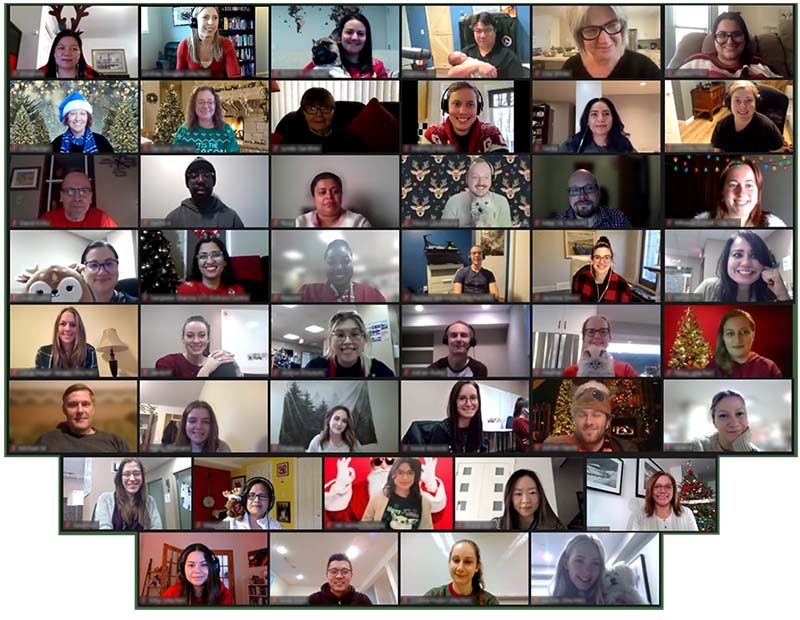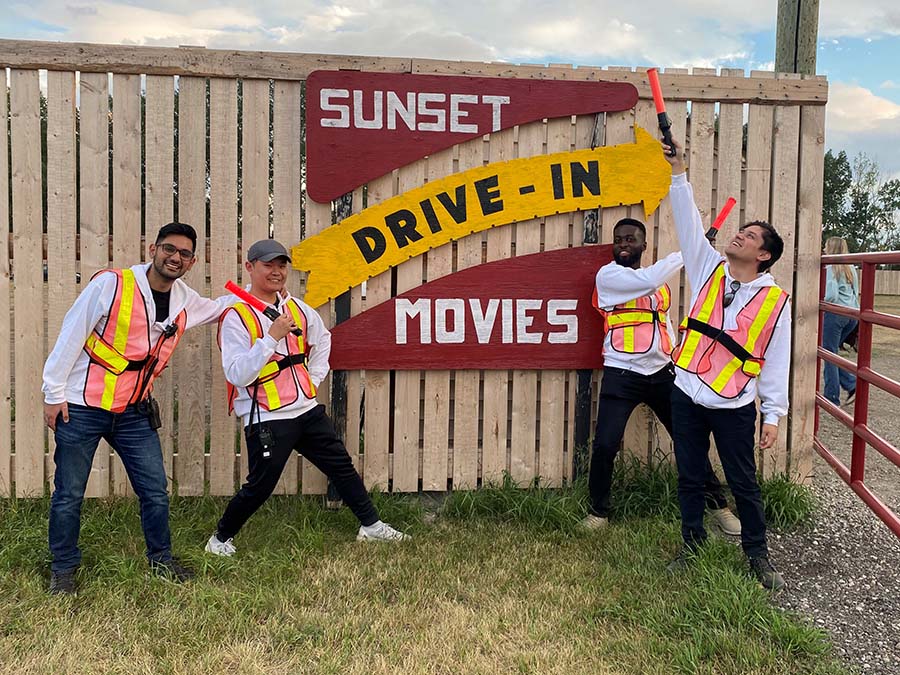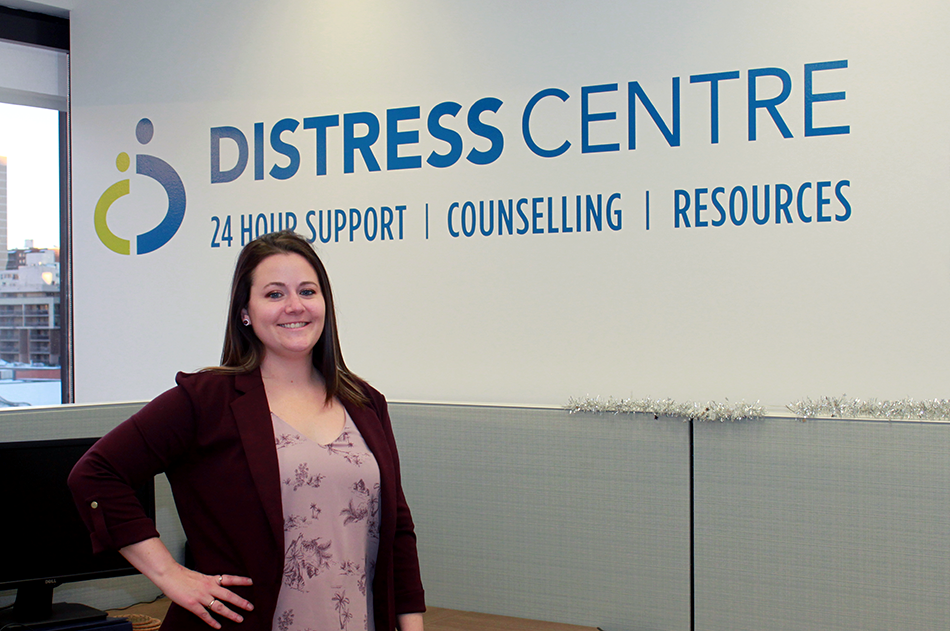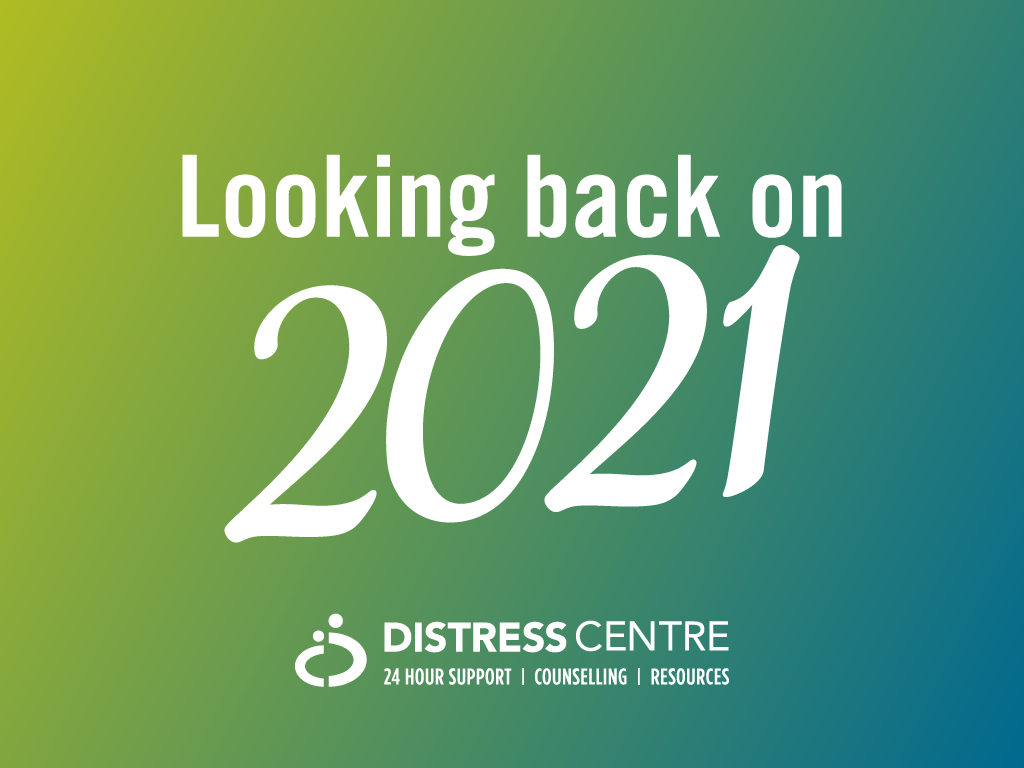Looking back on 2021 at Distress Centre
2021 was another challenging but exciting year for Distress Centre Calgary. Though we faced, and continue to contend with, the difficulties brought on by the COVID-19 pandemic, we also experienced growth, transformation and were able to celebrate some substantial achievements.
As we move forward into a new year, we wanted to take a moment to reflect on 2021.
In 2021 we responded to 152,272 total contacts. This includes crisis, ConnecTeen, 211, counselling and SORCe contacts, as well as well as contacts taken on behalf of partner agencies, including Canada Suicide Prevention Service, the Family Violence Info Line and the Bullying Helpline.
Notable Accomplishments
In 2021, we realized a goal that Distress Centre had been working towards since we first launched crisis chat in 2012. In October, we were pleased to announce the launch of 24/7 crisis chat and text! Crisis text became available in September and just a month later we expanded service hours for both chat and text to 24 hours a day, to match the 24 hour phone support we’ve offered since 1975.

If you need support, we are here for you, 24 hours a day. Phone or text 403-266-4357 or use our online chat portal.
Expanding online services meant expanding our volunteer pool. DC developed a remote online services volunteer position and for the first time in our history, people across Canada are volunteering remotely with Distress Centre.
In early 2021, we received accreditation from the American Association of Suicidology (AAS). AAS outlines the highest level of standards for crisis services in North America and is the foremost accreditor of such agencies.
Red Deer’s Social Diversion Team launched in January. Red Deerians can call 211 and press 2 when they see someone who needs non-emergency support, such as someone experiencing mental health issues, addictions crisis or homelessness. 211 Calgary answers these calls. In the first six months, the Social Diversion Team has responded to 878 events, reducing the number of non-emergency calls dispatched to emergency first responders.

For the DC team at SORCe, 2021 saw the introduction of key services and programs to meet the needs of people at risk-of or experiencing homelessness including ID replacement, housing location and diversion to housing as well as a ramp-up in basic needs provision. A client flex fund was introduced to provide easier access to housing, family reunification and access to treatment.
Our ConnecTeen program has struggled to spread awareness about its services, despite the huge need for youth mental health supports during the pandemic. The ConnecTeen team employed several methods to reach more teens, including pivoting from in-person to virtual presentations and community events, taking advantage of some generous pro-bono marketing opportunities (including a virtual escape room!) and expanding text and chat hours to 24 hours a day. This resulted in an increase in ConnecTeen contacts (calls, chats, text, emails) in 2021, over 2020 numbers.
COVID-19 Response
In March, we observed the one year anniversary of our initial COVID response. To recognize this unfortunate milestone, we released a series of stories titled “COVID-19: 1 Year Later” looking at how each of our programs adapted in the challenging first year of the pandemic.
In 2021, the pandemic continued to impact our services.
211
211 experienced an ongoing increase in demand for services and COVID-19 remained a top ten issue throughout the year. 211 was involved with Alberta’s overall COVID response, including connecting Albertans with transportation resources to get to vaccine appointments, completing intakes for isolation hotels and providing information and referrals for various COVID-related resources.
Crisis

On the crisis lines, we saw the number of COVID-related contacts fall as the year went on. However, suicide-related contacts increased throughout the year. We can’t attribute this entirely to the pandemic, but recognize the severe impact it has had on everyone’s mental health.
Counselling
Counselling sessions were provided by phone and video in 2021. We plan to safely bring back in-person sessions as soon as we can, but will still provide phone and video sessions going forward to have a more flexible range of choices for clients.
The top concerns clients identified during the past year related to anxiety, depression, loneliness/isolation, employment worries, substance use, and suicide. While anxiety and depression have frequently been top client issues, the sudden rise of loneliness and isolation spoke volumes about the impact of the pandemic.
“Generally, clients have been hesitant about acknowledging social isolation and loneliness as legitimate reasons for seeking counselling support, almost as if loneliness and the need for human connection were related to a moral weakness,” said David Kirby, Clinical Services Manager at Distress Centre. “Therefore, working to disentangle depression and loneliness has been very insightful for many clients.”
SORCe
Distress Centre’s Coordinated Access and Assessment (CAA) and Community Supports programs at SORCe have been providing in-person walk-in support since late 2020. The people who visit SORCe are at-risk of or experiencing homelessness and less likely or able to access services by phone or online. Safely proving in-person services has been possible through the hard work of the DC team at SORCe.
Outreach services to health and justice partners has not been possible during the pandemic. The CAA Team has adapted and provided phone, email and text services for people who are in institutional settings.
Leadership

2021 resulted in some big, exciting changes to our Leadership team. Jerilyn Dressler left Distress Centre after serving as Executive Director for four years. Robyn Romano, Director of Operations at the time, stepped into the role of Interim Executive Director as we searched for our new Chief Executive Officer.
After a five month search and recruitment process, the Board was delighted to appoint Robyn as Chief Executive Officer, as of October 12th.
We also welcomed Candice Giammarino as Director of Programs at SORCe in July and in December, Mike Velthuis Kroeze was appointed Director of Programs and Performance, after serving in an interim position and as Crisis Program Manager before that.
“This is a pivotal and transformational time for our agency and I am excited to lead us forward, backed by our strong leadership team, Board of Directors, and our incredible volunteers and staff.” – Robyn Romano, CEO
Conclusion
We are proud of what we accomplished in 2021 and excited to move forward into 2022, but we also want to acknowledge what a difficult year this was. As the world grappled with the ongoing pandemic, so too did our staff and volunteers.
Distress Centre’s people are providing support to a community in crisis while also dealing with the individual impacts of the pandemic in their own lives. As an agency we are doing difficult and emotional work, without being able to physically be together to support each other as we used to. It hasn’t been easy. A huge thank you to every person who has supported Distress Centre’s mission in 2021, whether it be as a staff, volunteer, Board member, donor or advocate.
Thank you as well to every person who took the courageous step of reaching out for help this year.
Our hope is that we continue our journey of growth and transformation in 2022, while also experiencing a return to some of the things we’ve loved and missed during the pandemic, in our agency and in the community and world at large.
If you want to support Distress Centre, make a donation or apply to volunteer.

